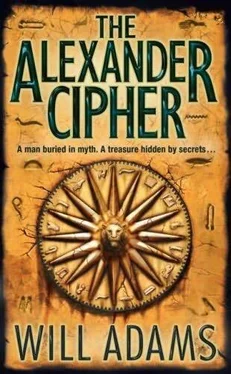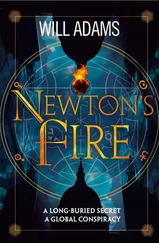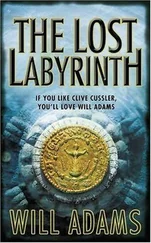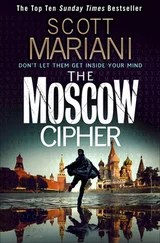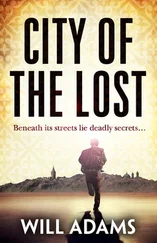Will Adams - The Alexander Cipher
Здесь есть возможность читать онлайн «Will Adams - The Alexander Cipher» — ознакомительный отрывок электронной книги совершенно бесплатно, а после прочтения отрывка купить полную версию. В некоторых случаях можно слушать аудио, скачать через торрент в формате fb2 и присутствует краткое содержание. Жанр: Прочие приключения, на английском языке. Описание произведения, (предисловие) а так же отзывы посетителей доступны на портале библиотеки ЛибКат.
- Название:The Alexander Cipher
- Автор:
- Жанр:
- Год:неизвестен
- ISBN:нет данных
- Рейтинг книги:5 / 5. Голосов: 1
-
Избранное:Добавить в избранное
- Отзывы:
-
Ваша оценка:
- 100
- 1
- 2
- 3
- 4
- 5
The Alexander Cipher: краткое содержание, описание и аннотация
Предлагаем к чтению аннотацию, описание, краткое содержание или предисловие (зависит от того, что написал сам автор книги «The Alexander Cipher»). Если вы не нашли необходимую информацию о книге — напишите в комментариях, мы постараемся отыскать её.
The Alexander Cipher — читать онлайн ознакомительный отрывок
Ниже представлен текст книги, разбитый по страницам. Система сохранения места последней прочитанной страницы, позволяет с удобством читать онлайн бесплатно книгу «The Alexander Cipher», без необходимости каждый раз заново искать на чём Вы остановились. Поставьте закладку, и сможете в любой момент перейти на страницу, на которой закончили чтение.
Интервал:
Закладка:
Dr. Serag-Al-Din had given them good news. He had found an HLA match: Basheer, a third cousin of Nur's mother, who herself had come close to death when her Cairo apartment block collapsed years ago. Mohammed had thought nothing of it at the time, had been completely indifferent to her life or death. But if she had died… He closed his eyes and brought a fist up to his mouth. It didn't bear thinking about.
But the HLA match meant nothing in itself. It mattered only if Professor Rafai now granted Layla a berth for a bone marrow transplant. Mohammed was here to learn of his decision.
"Insha' Allah, insha' Allah," muttered Mohammed again and again. The mantra did him little good. If only Nur were here-someone who understood. But Nur hadn't been able to face it. She was at home nursing Layla, more terrified even than he. "Insha' Allah," he muttered. "Insha' Allah."
The door of the oncology ward swung open. A plump young nurse with huge brown eyes came out. Mohammed tried to read her expression, but it was beyond him. "Will you come with me, please," she said.
Chapter Twenty-five
Kareem Barak's feet were raw and aching. Too much tramping these wretched roads in tight boots with leaky soles. He cursed himself for having answered Abdullah's summons and for agreeing to his terms. One hundred dollars to whoever found this one wretched Jeep! It had seemed too good to be true. But when Abdullah had assigned districts to search, he received this godforsaken stretch of farmland. How the others had sniggered! As if anyone would park out here! He ought just to give up, but those dollars had him by the throat. For Abdullah to offer a one-hundred-dollar reward, he had to be looking to make five or ten times that himself, which meant opportunities for a smart young man like Kareem to exploit. But first he needed some luck.
It was dusk when he saw the farm track and the ramshackle buildings some two hundred meters along it. The way his feet burned, it might as well have been two hundred kilometers. He had a sudden craving for a huge bowl of his aunt's kushari with extra fried onions, mopped up with great chunks of aysh baladi, then the welcoming embrace of his mattress. No way was the Jeep down there. Enough! He scowled and turned, hobbling painfully back the way he had come. But he'd barely gone twenty steps when a minibus of schoolgirls rattled past. One of them caught his eye and smiled shyly. She had good skin and huge brown eyes and luscious red lips. Staring after her, he forgot all about kushari and bed and aching feet. That was what he truly wanted: a beautiful, coy young woman to call his own. And for all his romantic dreams, he was a realist enough to know he would never have one until he earned some serious money.
He turned yet again and made the painful trudge up the track to the farm buildings.
Mohammed found it difficult even to walk as he followed the nurse. He had to remind himself how it was done: one foot and then the other. She led him to a large office, where Professor Rafai was flicking through the dividers of a white filing cabinet. Mohammed had seen him often on his rounds but had never before been granted a private audience. Mohammed didn't know how to read this. Some men delighted in granting good news; others felt it their duty to break bad. Rafai turned to Mohammed with a bland, professional smile that gave nothing away. "Sit, sit," he said, gesturing to his small round corner table. He pulled out a brown folder and came to join him. "I hope you've not been waiting long."
Mohammed swallowed. Did Rafai truly not understand? Then, suddenly, all Mohammed wanted was to go back outside and wait some more. When hope was all a man had, he fought hard to hold on to it. Rafai opened the brown folder and peered through his half-moon glasses at a sheet inside. He frowned as though he had just read something of which he had previously been unaware. "You understand what a bone marrow transplant would have involved?" he asked without looking up. "You understand what you were asking me to put your daughter through?"
It was a numb feeling, catastrophe. Mohammed felt cold and sick, yet at the same time immensely calm. He wondered bleakly how he would break this to Nur, if Layla would understand what it meant.
Rafai proceeded remorselessly: "We call this procedure bone marrow transplantation, but that is misleading. In ordinary chemotherapy we target only cancerous fast-dividing cells, but in this procedure we deliberately poison a person's entire system in order to destroy all their fast-dividing cells, cancerous or otherwise. That includes the bone marrow. The transplant is not the treatment. The transplant is necessary because after we annihilate all these fast-dividers, the patient will die without new marrow. It is a traumatic and extremely painful experience, without guarantee of success. Rejections occur despite perfect matches. And even if the new marrow takes, convalescence is extensive. Tests, tests, always tests. This is not the treatment of a few days. Scars stay for life. And then there's infertility, cataract blindness, secondary cancers, complications in the liver, kidneys, lungs, heart…"
Mohammed understood something then. Rafai wasn't here because the task was difficult; he was here because he relished exercising power. Mohammed reached forward to push down Rafai's folder. "Say what you have to say," he demanded. "Say it straight. Look me in the eye."
Rafai sighed. "You must understand that we cannot give a bone marrow transplant to every patient who needs it. We allocate our resources on the basis of clinical evidence, on who will be most likely to benefit. I am afraid the lymphoma has advanced so far in your daughter-"
"Because you would not do the tests in time!" cried Mohammed. "Because you would not do the tests!"
"You must understand that everyone here loves your-"
Mohammed rose to his feet. "When did you decide this? Did you decide before we did the tests? You did, didn't you? Why didn't you tell us? Why did you let us go through that?"
"You're wrong," said Rafai. "We didn't make the final-"
"Is there anything I can do?" pleaded Mohammed. "Anything at all? I beg you. Please. You can't do this."
"I'm sorry." He smiled blandly. The interview was over.
Mohammed had never previously understood failed suicides; the ones commonly described as cries for help. But in a moment of insight he realized that some conversations were simply too difficult to broach without some kind of act to demonstrate the overwhelming strength of feeling involved. He couldn't face Nur and Layla with this news. It was beyond him. So he picked Rafai up by the lapels of his jacket instead and slammed him against his office wall.
It was a good seven-hour drive from Alexandria to Siwa Oasis, where Elena and Gaille were due to begin a survey of antiquities as cover for their search for Alexander's tomb. It was an uninspiring journey, too, first heading west along the scrubby, overbuilt Mediterranean coast, then south through flat and empty desert, with nothing to see for mile after mile but the occasional service station or herd of wild camels, until they topped a rise and the relentless emptiness was suddenly broken by glittering white salt lakes and orchards of silver-green.
They pulled into Siwa's market square as a muezzin called the faithful to prayer, and the sun vanished behind the dark rose ruins of the old Shali Fortress. The streets here were wide, spacious, and dusty. There were few cars or trucks. People walked, cycled, or took donkey carts. After the bustle of Alexandria, Siwa seemed gloriously leisurely and content. Gaille rolled down her window and inhaled deeply. Her spirits lifted. Siwa was truly the end of the road. There was nothing beyond it but the great Sea of Sand. The oasis had no purpose but itself.
Читать дальшеИнтервал:
Закладка:
Похожие книги на «The Alexander Cipher»
Представляем Вашему вниманию похожие книги на «The Alexander Cipher» списком для выбора. Мы отобрали схожую по названию и смыслу литературу в надежде предоставить читателям больше вариантов отыскать новые, интересные, ещё непрочитанные произведения.
Обсуждение, отзывы о книге «The Alexander Cipher» и просто собственные мнения читателей. Оставьте ваши комментарии, напишите, что Вы думаете о произведении, его смысле или главных героях. Укажите что конкретно понравилось, а что нет, и почему Вы так считаете.
